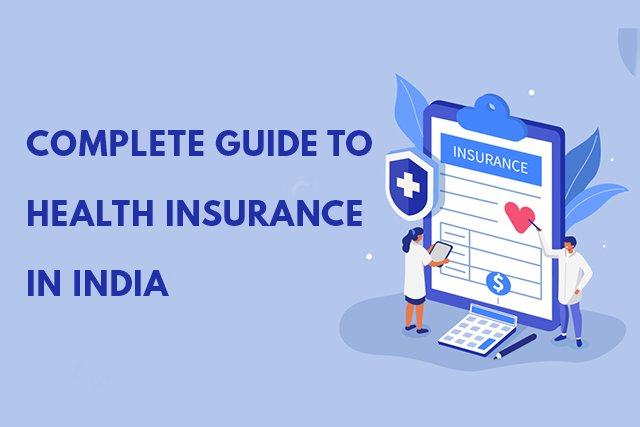Complete Guide to Health Insurance in India
- By MultiSphere

Health insurance is a safety net that takes care of your financial wellbeing in case of a medical emergency. A health insurance policy covers medical expenses you might incur due to accidents, illness or injury.
Technically, it is a contract between you and your health insurance company. It means the insurer will bear some or all medical expenses you incur against a certain fee (premium) you will pay. There are generally two ways through which the insurer pays for your medical expenses:
- Take a cashless treatment where you don’t have to pay. The insurance company pays the hospital directly.
- You can pay your medical expenses first and then later ask for reimbursement from the insurance company.
Why You Need Health Insurance
Buying a health insurance policy is not something that most people willingly do, until it is too late. While the awareness and intent to buy health insurance has increased, it is still not seen as a priority. There is still a big lag between the intent and actual buying.
A medical emergency can come knocking anytime. If you are young, chances of falling ill are low but not zero and accidents can also happen. The medical expenses associated with such situations could make a big hole in your pocket. A good health insurance plan can protect you from this financial blow to your savings and provide you the much-needed cushion to bear the costs towards doctor’s visits, tests, medicines and other procedures.
Healthcare expenses are increasing at a rate higher than medical inflation; health insurance helps you to get the required treatment without cutting any corners for the lack of funds.
And to top it all, the premiums paid are tax deductible upto specified limits!
The sooner, the better. Let’s take a look at buying a health policy at different life stages:
The best age to buy a policy. You are likely to be in good health with limited financial responsibilities and pressures. Investing in a health insurance plan at a younger age certainly has its own advantages like better sum insurance for a lower premium amount, no medical tests required and so on.
This is the settling down phase. You will most likely be married, planning to start a family, invest in a home, etc. Add to it, lifestyle diseases that are increasingly affecting the younger population. Buying a policy at this stage will need you to factor in all these aspects. Be prepared for a higher premium and higher chances of a claim.
A stage where your financial responsibility is likely to be at its peak. You will need a higher sum insured resulting in higher premiums. If you have fallen prey to diabetes, hypertension, etc. then expect longer waiting periods. You will also need to consider add-on benefits to ensure the additional protection needed is taken care of. Also, be prepared for a medical screening prior to getting the policy. Usually, for anyone above 50, medical screening is a prerequisite.
You will need a high sum insured that comes at a hefty premium. A life stage where you anticipate long term treatment for critical illnesses and hospitalisation, etc. Opt for senior citizen health policies. Research, compare and choose the best one. Typically at this stage, policies come with a co-pay condition which mean that you have to bear part of the medical cost.
There are basically two types of health insurance plans you can choose from — individual plan and family floater plan. Both policies can be described in a few words: a family floater as “one plan to cover them all” and Individual cover as “different strokes for different folks”. Your choice will depend entirely on factors such as your age, your kids’ ages, medical history, and budget.
It is important for you to thoroughly understand both types and make a smart decision that works best for you and your family.
An individual health insurance policy is issued in the name of a single person. This means the sum insured is dedicated to the insured in its entirety. For example, if you are the policyholder and find yourself in need of hospitalisation, the insurer will cover your expenses up to the sum insured. Any leftover amount will remain available for use during the rest of the policy period.
For example, if you purchase a plan for yourself, your spouse and child, for a sum insured sum of INR 4 lakh, all three of you will be covered by the insurer within that sum, regardless of who is hospitalised. The age of only the most senior family member is considered when the premium is calculated. If you’re a young parent with small children, this could work in your favour. You’ll be able to get cover for your loved ones for a very affordable price.
Remember:
- If you’re looking to insure your elderly parents, instead of buying a family floater, choose separate plans for yourself and your parents as it will prove more affordable. Under the family floater option, the premium usually gets pegged to the oldest person in the family and therefore with your parents in the same plan, the premium for all of you will likely be higher.
- Also, if you have a family member who is unwell and likely to claim for a significant chunk of your sum insured, an individual policy might be the smarter option.
Points to Consider While Choosing Your Health Insurance Policy
- Comprehensiveness of Cover
Choose the amount of coverage or ‘Sum Insured’ keeping in mind the cost of medical treatments today, the inflation rate and your current requirements. Re-evaluate the cover needed every year while renewing. - Premium
The premium you pay depends on multiple factors such as the amount of cover opted for (sum insured), your age, your medical history, the type of plan you have picked, etc. While evaluating options, look for an insurance provider who offers you most of the features and benefits you are looking for at the best possible rate. While premium is important to consider, it should not be the primary decision-making factor. - Know what’s included and what’s not
While choosing a policy, remember to check what all is included in the policy, and what are the conditions under which a claim cannot be made. Having clarity saves the hassle and pain of claim rejections later. -
Room rent sub-limits
The room rent limit specifies the maximum room rent coverage allowed under your health policy. Different health insurance companies have their own rules for room rent and capping, which will be clearly mentioned in the policy document. Before buying a health insurance policy, make sure that you understand how the room rent limit works and make an informed choice. Consider this factor depending upon the type of room and kind of hospital you may want to go to.
-
Network of hospitals
Check for the list of hospitals available under the policy that provide cashless facility. Try choosing a policy that has a wide network of hospitals. In case you travel frequently, please also check global hospital networks.
-
Co-pay
This clause allows you to reduce your premium while buying a health policy by offering to pay a fixed percentage of the total claims made during the policy year. In case you opt for co-pay, you can select the percentage you wish to commit, right at the beginning.
-
Waiting period
This is the time period during which claims will not be accepted. Different policies have different waiting periods. For claims related to pre-existing illness, the waiting period is longer. Look for the policy that has the least possible waiting period.
-
Critical Illness
Incidence of critical illnesses like heart attacks, strokes, cancer, etc. is on the rise. Treatment cost of these life-threatening illnesses is also very high. It is advisable that you choose a health plan that can take care of these expenses if they occur. It comes at an additional cost, so please evaluate your needs, and buy it if you can afford it.
-
No Claim Bonus (NCB)
This is the reward you get from your insurance provider for not making any claims during a policy year. The bonus can either be given as a discount on your insurance premium for the following year, or it could be a higher sum insured for the same premium. Make your choice wisely!
-
Day care procedures
Certain medical procedures like cataract are completed within a day and do not require hospitalisation. It is therefore important to know if such treatments are covered in your plan.
-
Alternative treatments
AYUSH (ayurveda, yoga, unani, siddha and homoeopathy) treatments are gaining importance and becoming preferred modes of treatment for a lot of people. Most health plans these days provide coverage for such alternative treatments. If you prefer AYUSH over allopathic medicine, ensure your policy covers the same.
-
Reputation of the insurance company
Consider factors like claim settlement ratio, solvency ratio, customer service, product portfolio, etc.
Here are some common exclusions for health policies. But before making your choice, check and understand the exclusions since they differ from policy to policy.
- Cosmetic procedures
- Dental procedures
- Some pre-existing conditions
- Congenital diseases
- Non-prescription drugs
- Injuries incurred from war, terrorism and suicide
- Get detailed information about different health policies that are available according to your requirement. Research and compare policies at your convenient place and time
- A 100% do-it-yourself (DIY) process. Even if you need an agent, you can avail services in a few clicks online itself
- It can be super-fast to buy the policy online, if you are looking for a basic health insurance cover – in this time starved era, time is money right.
- No paper required or physical signatures.
Source: Forbes
Connect with us and FREE recommendation!
Mutual Fund
Insurance
More Investments
SIP





